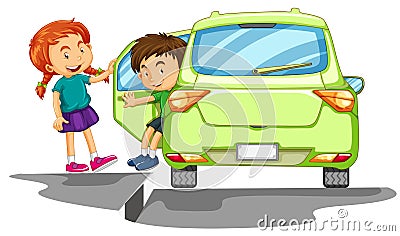The Easter holidays have just begun and I am using my first day to write a blog entry. I must not be much of a holiday fan myself, he he. Anyway, I feel like devoting this entry to one recurrent verb in the English language, no other than the verb 'get'. My students of Básico I keep asking me what it means. They simply want a Spanish translation for this English verb, something which is just not possible. If you are learning English, the verb 'get' will accompany you during your trip (just like the verb 'have', click on this link if you want to revisit my post about the verb 'have'). Let's begin. The verb 'get has multiple uses in English :
1. 'Get' as a normal verb :
When you studied irregular verbs at school, the teacher probably told you that 'get' is a synonym for 'conseguir' ('achieve') and this can be true :
- I got 10 in the English exam (=achieve)
However, 'get' has multiple meanings :
- I got an email from my boss (=received).
- We need to get bread for the dinner (=buy).
- John got a taxi to the airport (=take).
- We got a cold after skiing. (=catch).
- You still don't get it. (=understand).
- Now, he gets a lot of money in his new job (=earn).
'Get' can sometimes surprise it because it can work as an auto-antonym :
- I need to get Laura a present for her birthday (=buy).
- I got an awful present from Laura (=receive).
When 'get' is followed by the preposition 'to', it means 'arrive'.
- After ten hours, I finally got to the United States (=arrive).
2. 'Get' + adjectives
This is a special use of 'get'. In this case 'get' works as a copular verb (followed by a subject complement). This use normally corresponds to reflexive verbs in Spanish (verbs finished in 'se'). In all these cases, 'get' is a synonym for 'become.' Have a look :
ENGLISH
|
SPANISH
|
Get married
|
Casarse
|
Get divorced
|
Divorciarse
|
Get engaged
|
Prometerse
|
Get ready
|
Prepararse
|
Get angry
|
Enfadarse
|
Get bored
|
Aburrirse / hartarse
|
Get tired
|
Cansarse
|
Get lost
|
Perderse
|
Get dressed
| Vestirse |
Get naked
| Desnudarse |
There are other examples where 'get' doesn't correspond with reflexive verbs in Spanish :
- The cinema is getting more and more expensive (=become).
3. 'Get' + prepositions/adverbs
In basic levels, 'get' is associated to means of transport :
We use 'get on' to get on board all the means of transport (the bus, the train, the ship, the plane, the bike, the motorbike...), except the car (or similar). We use 'get off' to descend from the previous means of transport.
 |
| The children are getting on the bus. From : https://clipartfest.com/categories/view/0507004ce4bf4eaff5c97d6bcbfa320ca3666a7d/getting-on-the-bus-clipart.html |
 |
| The children are getting off the bus. From : https://clipartfest.com/categories/view/84b97c67db0570d289c34b08697f3677886688d8/get-off-the-bus-clipart.html |
The car, however, is different. With the car, van and taxi, we use 'get into' to go onboard, and 'get out of' to descend.
 |
| The man is getting into the car. From : https://clipartfest.com/categories/view/31da91539baba464590a8e8180955dac49f13e7c/getting-in-the-car-clipart.html |
 |
| The boy is getting out of the car. From : https://es.dreamstime.com/stock-de-ilustraci%C3%B3n-el-salir-del-muchacho-del-coche-verde-image70687530 |
However, this is going to get more complicated. 'Get' is the protagonist of a great deal of phrasal verbs, prepositional verbs and phrasal-prepositional verbs.
Get up : I get up at six o'clock every day (=stand / sit up).
Get on (well) with : He doesn't get on well with his mother-in-law. They argue all the time (=have a good relationship).
Get along : They argue all the time. They don't get along (=have a good relationship).
Get by : I get by with 300 euros a month. / I can't speak Chinese well. I only get by in Chinese (=to survive, or manage to do something)
Get away (with) : He killed him and got away with it (=escape).
Get across : He managed to get his message across (=communicate).
Get over : After a long week, he finally got over the flu (=recover).
Get around : He likes getting around the city (=travel).
Get through : I have to get through with a lot of work (=finish).
I phoned you but I couldn't get through (=communicate).
Get back : I have to go. I need to get back to work (=return).
4. Get in passive sentences
In English, the passive is normally formed with the verb 'to be.' However, only when the subject is a person, we can use 'get' in the passive. Have a look at the examples :
- In Spain, teachers get paid less than in England.
- Paul got fired yesterday.
5.'Get' in causative constructions
In English, we can use the structure 'passive subject' + verb 'get'/'have'+ object + participle, to indicate that someone does something for you. It has passive meaning :
'I got my hair cut yesterday by the hairdresser.' = The hairdresser cut my hair yesterday.
'I got my car painted last summer.' = A painter painted my house last summer.
Another possibility is to use the structure 'get + person +participle', for example, 'smoking will get you killed.'
Yet another option is to follow the structure : subject + verb 'get' + person + to-infinitive : 'I got my assistant to look for information about new technologies.' (=force / make) 'I made my assistant look for information about new technologies.'
6. Expressions with 'get'
There are some important expressions with 'get' my favourite being : 'you have to get going' (=get started), or get to know a person (=when you finally really know someone).
Well, as you know, the verb 'get' in English is pretty complicated. I hope I have shed some light and that know you have got to understand it better, he he.
See you around.
No comments:
Post a Comment